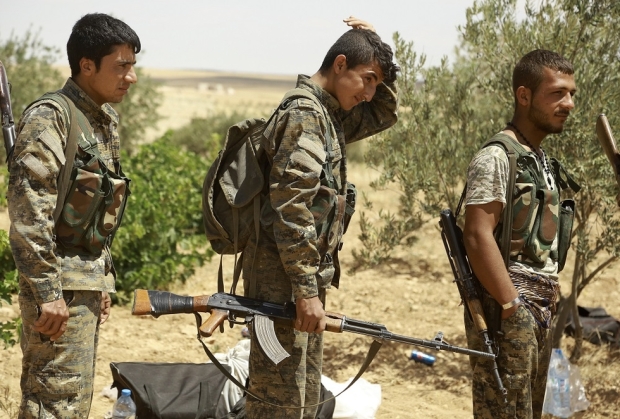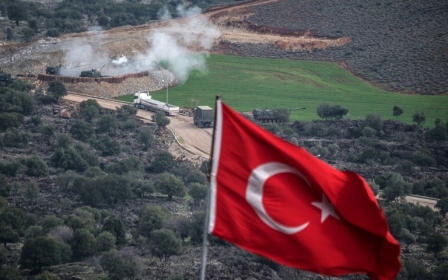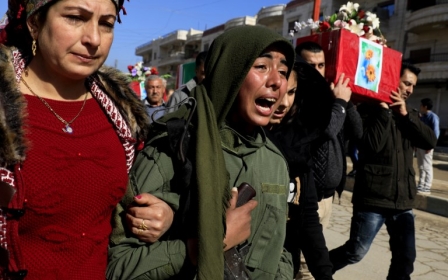Why Iran cautiously supports Turkey's operation in Afrin

The Turkish offensive in the Afrin enclave has elicited a strong reaction from Damascus, with Syrian President Bashar al-Assad condemning the operation as part of Turkey's plan to aid extremist groups.
Undoubtedly Damascus is genuinely fearful that Turkey is using national security concerns as a cover to advance its position in Syria, in addition to boosting its regional geopolitical profile.
Cautiously supportive
Syria also has deeper concerns about the effect of the Turkish operation on the complex set of power relations in the conflict, notably the effect it has on the Russian, American and Iranian postures in Syria.
To that end, Damascus is alarmed by apparent Russian acquiescence to Ankara's latest incursion into Syria. Specifically Damascus is fearful of excessive Russian accommodation of Turkish demands, notably the near-permanent entrenchment of pro-Turkish Syrian rebels in the north-west corner of the country.
The political legitimisation of these factions - who have little public support - is inimical to Damascus' plans to restore full sovereignty across the country.
The dominant analysis flowing from the Iranian foreign policy establishment centres on intra-Kurdish disputes and miscalculations in the midst of complex geopolitical processes
Iran's position though is harder to decipher. While officially the Islamic Republic has expressed concern at the Turkish operation, privately there is reason to believe the Iranian position is more nuanced and in some important respects cautiously supportive of Turkish policy.
Iran shares Turkey's concerns over the empowerment of forces aligned with the Kurdistan Workers' Party (PKK) in Syria. While the Islamic Republic is wary of Ankara's strategic intentions in Syria, nonetheless it is willing to accommodate legitimate Turkish national security concerns.
Furthermore, the prospect of a potential Turkish-US clash in Syria – albeit by proxy – is naturally relished by Tehran. In addition, Tehran is hoping the outcome of the Turkish offensive will boost Damascus' position in the final stage of the war.
An ambiguous attitude
The rise of the PKK in Syria is in part due to a conscious decision by the Syrian government to withdraw from Kurdish-populated regions of the country in 2012. That decision may have in turn been influenced by Iranian "advisors" who from late 2011 onwards were providing a wide range of political, information warfare and intelligence services to the Syrian government.
The Syrian decision was predicated on a simple logic, namely instead of wasting resources in holding Kurdish-populated areas, the Syrian Arab Army (SAA) and the Syrian security forces would instead concentrate resources against the emerging rebel factions.
Indeed, prior to his capture in Nairobi in February 1999, the PKK leader Abdullah Ocalan was based in Syria for 15 years. Syria was forced to partially withdraw support for the PKK following credible threats of military action by the Turks.
But as the Syrians have found to their cost, it is one thing to support the PKK inside Turkey, and quite another to witness the development of a PKK-aligned proto-state in the form of "Rojava" within their borders.
Tehran can hardly be displeased by rising tensions between Nato allies Turkey and the United States
While Syrian forces and the YPG have generally avoided direct clashes – with a few notable exceptions in Deir Ezzor – the Kurds' alliance with an increasingly assertive US military presence in Syria is a cause of profound concern for Damascus.
More broadly, Damascus is acutely aware of Turkey's propensity to conflate its legitimate national security concerns with regional geopolitical ambitions. In respect of operation "Olive Branch", the risk of a long-term Turkish military presence and the consequent galvanisation of the pro-Turkish faction of the Free Syrian Army (FSA), is hard to mitigate.
"Olive Branch" is the second major Turkish military incursion in Syria, following operation "Euphrates Shield" which began in August 2016 and concluded the following March.
While the latter was also framed as a counter-terror operation - and primarily aimed at containing the Islamic State (IS) group – Damascus was understandably perturbed by the precedent it set in the form of repeated sovereignty violations by an unfriendly neighbour.
While some Iranian analysts share Syrian concerns about Turkey's ultimate intentions – and wonder aloud if Iran could be one of the losers from Turkey's latest incursion – the real Iranian position is somewhat different.
Containing the US
The dominant analysis flowing from the Iranian foreign policy establishment – as expressed by the head of the Strategic Council on Foreign Relations – centres on intra-Kurdish disputes and miscalculations in the midst of complex geopolitical processes.
This analysis connects the miscalculation leading to a Turkish assault on Afrin to the miscalculation by an entirely different Kurdish faction (namely Massoud Barzani's Kurdistan Democratic Party) which provoked the Iraqi takeover of Kirkuk following the Iraqi Kurds' illegal independence referendum last September.
The conclusion is that the Turkish operation is potentially helpful inasmuch as it indirectly strengthens Damascus' hand in future negotiations with the Syrian Kurds. Furthermore, according to this analysis, the Syrian Kurds may relinquish some of their territory to Damascus in order to avoid fighting a losing war against Turkey.
More broadly, Tehran can hardly be displeased by rising tensions between NATO allies Turkey and the United States. The US alliance with the Syrian faction of the PKK – which flies in the face of the latter's terrorist designation by the US State Department – is the lynchpin of US policy in Syria.
A common strategy
The US Secretary of State Rex Tillerson has just framed the US military presence in Syria as primarily aimed at countering Iranian influence in the country. In view of this clear-cut strategy, Tehran will be aiming at securing operational and strategic outcomes which counter hostile US plans.
Integrating Turkey deeper into the Iranian-Russian axis could be a winning strategy for Tehran. While Turkey is officially part of the Astana peace process whose "National Dialogue Congress" has just ended in the Russian resort of Sochi, nonetheless the Turkish posture in Syria significantly diverges from both Russia and Iran.
For a start, Turkey is still strongly committed to the Syrian opposition, in addition to backing armed rebels on the ground.
In light of this reality, the most effective way of bridging the divide between Ankara and Damascus is to start a dialogue on a common strategy aimed at containing, and ultimately defeating, the YPG/PYD fiefdom in northern and eastern Syria.
In the weeks and months ahead, the critical factor will be the degree of US resistance to Ankara's declared goal of ousting the Kurds from Afrin and nearby Manbij.
But ultimately, short of committing to a long-term military presence in Syria, the US may be powerless to sabotage a Turkish-Syrian dialogue on the resolution of the "Rojava" problem.
- Mahan Abedin is an analyst of Iranian politics. He is the director of the research group Dysart Consulting.
The views expressed in this article belong to the author and do not necessarily reflect the editorial policy of Middle East Eye.
Photo: Turkish President Recep Tayyip Erdogan meets with Iran's President Hassan Rouhani during an extraordinary meeting of the Organisation of Islamic Cooperation (OIC) in Istanbul, Turkey, 13 December 2017 (REUTERS)
New MEE newsletter: Jerusalem Dispatch
Sign up to get the latest insights and analysis on Israel-Palestine, alongside Turkey Unpacked and other MEE newsletters
Middle East Eye delivers independent and unrivalled coverage and analysis of the Middle East, North Africa and beyond. To learn more about republishing this content and the associated fees, please fill out this form. More about MEE can be found here.






